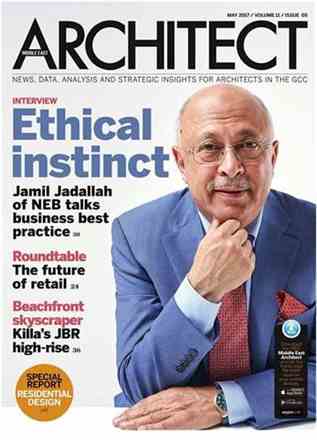Conducting business according to a firm set of standards and an open and honest approach emphasising loyalty to clients are the keys to success across the increasingly competitive market place of Dubai.
That is the view of Jamil Jadallah, CEO of National Engineering Bureau, who first joined the company 33 years ago and became a partner in 2002.
“Always my vision is for the long term,” he said. “I don’t just look at a single project when it comes to working with a client. I want to build a real relationship. I prioritise loyalty to clients, along with honesty.
Acknowledging the lifespan of NEB; established in 1984 by Mr. Jamil Jadallah and his 2 business partners, the company has stood the test of time living through the boom that was the Dubai era yet surviving and surpassing expectations during the major recession of 2008. The company still remains under the same management with Mr. Jamil as the firm’s Managing Director, who has amassed more than 33 years of practical experience within the world of Engineering and Architecture.
“Honesty comes from both sides. For us, we have to give all of our experience and that is not easy all the time.
But we need to establish, along with the client, what sort of project they envision. Also what size is it going to be and what are the aims and objectives. That way we can give over all of our expertise.”
This approach is one which benefits a continuing partnership between developer and architect, said Jadallah.
“I believe that is a project is successful, clients will continue to give us their business. They will do another, and then another. The client will feel the importance of our input.
“But when I look to start this process I look for a serious approach from whoever I am going to work with. The project cannot be just a possibility. It has to have been examined from all possible angles to ensure that it is feasible.”
Once committed to a development NEB will put all its weight behind it, Jadallah said.
“I don’t want us to just do drawings,” he said. “I want us to share everything.”
Coming from humble beginnings in Amman, Jordan, Mr. Jamil first came to Dubai many years ago, taking a job at the Dubai Municipality and working up to Senior Engineer. With his broad knowledge of the industry and the region, he then decided to start his own firm- NEB. With the firm starting small at no more than 4 members of staff, NEB now employs nearly 500 staff from all over world.
Jadallah said he felt that it was around 2002 when things started to really take off in the UAE’s architectural development.
“The images, the picture of the future and the size of projects all changed, especially in Dubai,” he said. “A revolution started in size and volume of developments. There was great competition to create new ideas. We had added fresh blood to an experienced team and took on work with Emaar on big projects such as the Marina and Jumeirah Lake Towers.”
The new personnel helped to drive the business forward and the NEB CEO outlined what he thought makes for a successful architect: “He, or she, should be professional, creative and hardworking. But for me, loyalty is again also a very important factor. That is a vital key to a successful working relationship.”
A consistent mentor and inspirational leader at the firm, Mr. Jamil believes in investing in his staff, nurturing new talent and continuous innovation. NEB now employs more than 420 talented Architects and Engineers and boasts a large portfolio of projects spanning across the Gulf countries, India, Tanzania and Turkmenistan.
NEB has amassed years of experience within the region, resulting in an impressive and varied portfolio. Projects include skyscrapers, hospitality, mixed use developments and schools. Having designed and built over 50+ projects within the UAE, it’s is not doubt that NEB has the most successful school department within the region, with new school developments confirmed as of this month due to be built in the near future.
Some of our notable projects include our soon to be completed project of Marina 101, which will be recognised by the Council of Tall Buildings and Urban Habitat as the second tallest tower in Dubai after the world famous Burj Khalifa.
Public and private partnerships (PPPs) are one way in which the Middle East can continue to lead the way in innovative design and build developments, said Jadallah.
“The private sector cannot do everything,” he said. “Initial investment, for instance, can be shared with the obtaining of public funds. The private sector knows how to get things done in a relatively short period of time while the public sector can help to alleviate the risk in financial terms, as well as assist in regulatory ways and with advice.
“Both sides win and the project gets built.”
Jadallah said he is extremely optimistic about the future and feels that Dubai, especially, is in good shape to continue its reputation for innovation and forward thinking across architecture and design.
He explained: “What you find here, you won’t find in any other place. That is the freedom of people to express themselves across so many different fields, not just architecture. In Dubai the rights of all people, their security and safety, are truly respected. Providing people keep within the law they can do what they want and this thought is brought over to design as well. Architects can create with great freedom, while still keeping within some boundaries.
“That is the feeling I get from the many expatriates I speak to. They feel that as their rights are so respected they, in turn, show great loyalty towards their adopted home. I certainly feel that the UAE as a whole is now my first country [Jadallah is originally from Jordan]. This is where my loyalty, faith and trust is placed.”

